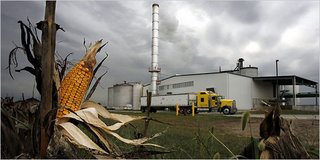Avoiding "biofuelishness"

Agricultural-based biofuels are not a silver bullet solution to the nation's simultaneous search for an alternative to gasoline and an end to economic woes of American Heartland farmers. The rush to raise corn and soybeans for the purpose of producing ethanol may not sustainable for a variety of reasons, most notably the impact this would have on the health of our soils - the source of all life. Finally, this focus continues to emphasize the internal combustion engine and thereby runs the risk of turning attention and resources away from pursuing the potentially more beneficial path toward electric vehicles. (GW)
Renewable Energies, Conservation May Play Larger Roles in New Farm BillBy Josh Swartzlander
infoZine Staff
The farm talk on Capitol Hill is biofuels, biofuels, biofuels.
Washington, D.C. - As Midwestern Democrats suddenly find themselves in key positions to shape the 2007 Farm Bill, they're clamoring for more incentives for farmers and ranchers to develop and produce agriculture-based fuels such as ethanol and biodiesel.
"If there's one thing that's clear, we're all going to work to make the energy title the driving force of the next farm bill," Sen. Tom Harkin, D-Iowa, said.
Harkin will be chairman of the Senate Committee on Agriculture, Nutrition and Forestry next year. The current farm bill expires after 2007.
Rep. Collin Peterson, D-Minn., who will become chairman of the House Agriculture Committee, also has pledged support for biofuel incentives. So has Speaker of the House-to-be Nancy Pelosi, D-Calif.
Harkin, Pelosi and other leaders in Congress trumpet biofuels as environmentally friendly alternatives to reliance on foreign oil.
Many scientists, who have become more vocal on the issue in recent months, have a more sobering message.
Biofuels "will not solve any of our large-scale problems, but they will impact negatively on the environment," such as destroying or contaminating air, soil and water, said Tad Patzek, professor of geoengineering at the University of California, Berkeley.
"Politicians are lying to the public, and the public is accepting the lies," he said. "In the meantime, we're not doing things that can matter."
According to a University of Minnesota study released earlier this year, soybean-based biodiesel and corn-based ethanol harm the environment less than regular diesel and gasoline. In addition, the biofuels are worth more energy than is needed to create them.
However, according to the study, "Neither biofuel can replace much petroleum without impacting food supplies."
Using all U.S. corn and soybeans for biofuels would meet only 12 percent of U.S. gasoline demand and 6 percent of diesel demand, the study found.
Including significant incentives for biofuel production in the next farm bill would "prolong our addiction to the internal combustion engine and driving," said James Jordan, a research professor at Polytechnic University of New York.
"If they think it's smart to throw ethanol in their cars, they're devoid of science-based deliberation," he added. "It's a quick buck."
Harkin and other lawmakers point to cellulosic ethanol, made from any plant matter - even municipal waste - as the biofuel of the future. Prairies grasses such as switch grass have shown potential as efficient, conservation-friendly biofuel crops. Harkin and Pelosi are also promoting other alterative fuel sources, including wind, water and fuel cells.
Jason Hill, lead author of the University of Minnesota study, said the next farm bill provides an opportunity for lawmakers to restructure subsidy payments - paying farmers to conserve soil and water and to produce a wider range of crops, including crops used to make biofuels, rather than paying them traditional subsidies based on commodity crop harvests and prices.
Said Jordan: "Conserving cropland ought to be one of our main public policy goals."
Members of Congress, including Harkin and Peterson, as well as farm industry representatives said conservation programs are likely to play a much larger role in the next farm bill.
"I think conservation is going to be a major factor," said Ferd Hoefner, policy director for the Sustainable Agriculture Coalition.
However, Hill said, the U.S. shouldn't lock itself into the production of "first-generation" biofuel crops, including corn and soybeans, with the 2007 Farm Bill. It's important to invest in the research and development of "second-generation" biofuel crops, including switch grass, as well as other cellulosic technologies, he said.
Patzek warned that the U.S. should not depend on a magic-bullet technology to end its dependence on foreign oil and to solve its energy crisis.
What should be done?
"We need to sober up, get over our hangover and start facing facts," he said, adding that the U.S. should stop depleting soil, contaminating water and spewing carbon dioxide into the atmosphere.
If the entire U.S. transportation industry increased its fuel efficiency by 15 percent, the need for foreign oil imports would disappear, he said.
Jordan advised developing more public transportation and researching battery-powered vehicles.
"Let's go cautiously with using croplands to produce ethanol," he said.

0 Comments:
Post a Comment
<< Home